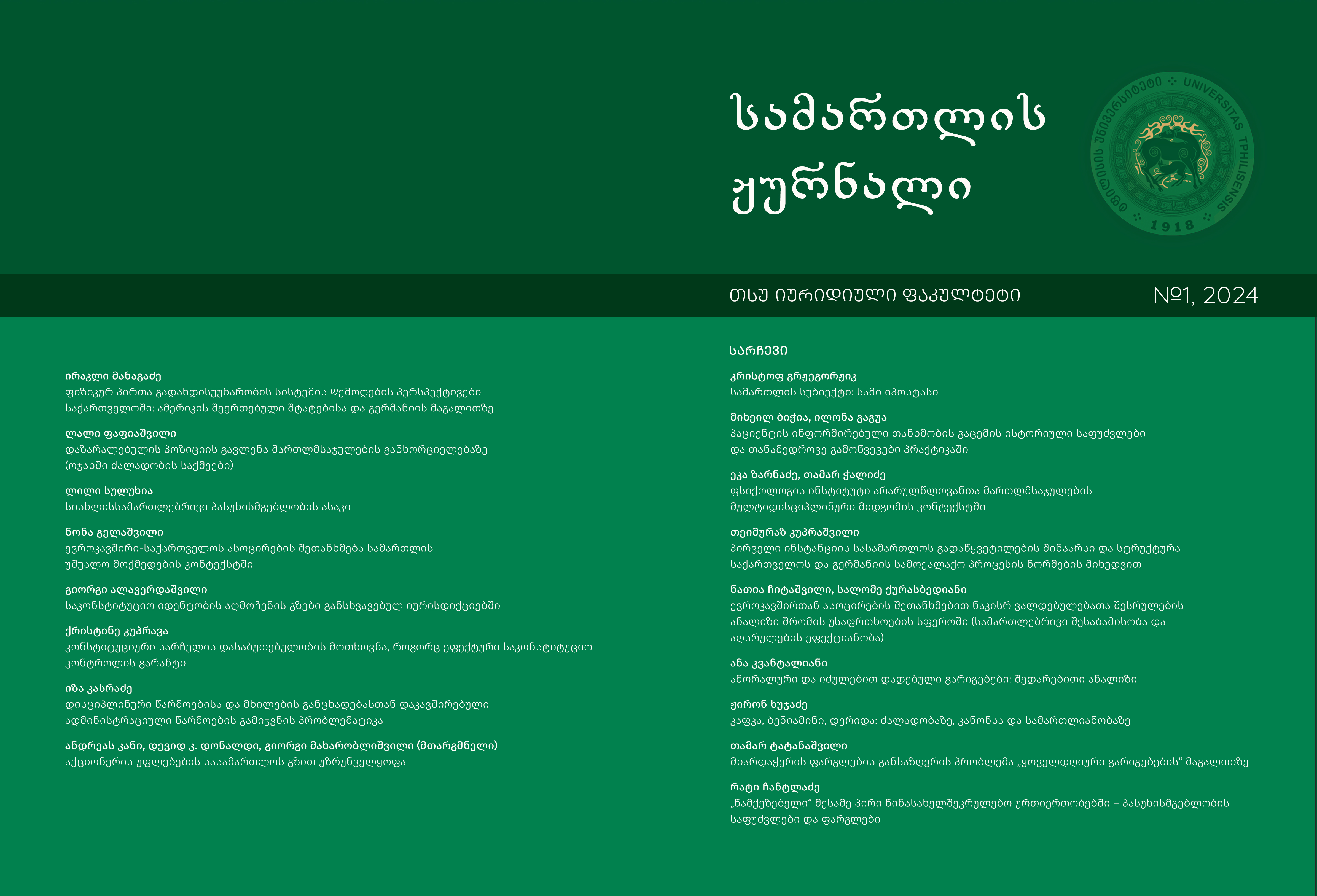Age of Criminal Responsibility
DOI:
https://doi.org/10.60131/jlaw.1.2024.7946Keywords:
Child, Juvenile Justice, Punishment, Physiological problems, Physiology, Social.Abstract
This article is dedicated to the age of criminal responsibility. The relevance of this topic is defined by studying the physical and mental nature of a child and taking into account the socio-economic factors affecting him/her, it is possible to identify the problematic nature of the age of criminal responsibility.
The measure applied to a child committing a criminal act should be proportional to the severity and circumstances of the offense, as well as the conditions and requirements of the child considering his/her best interests.[1]
Introducing this study, a reader will be convinced that children in conflict with the law should not be treated as adults because of their limited emotional, psychological, moral, and social development.
[1] International Standards in the Field of Juvenile Justice, UNICEF, 2011, 35, adopted by UN resolution N40/33 of 29 November 1985.
References
. Code on the Rights of the Child, 27/09/2019.
Criminal Code of Georgia, 23/02/2019.
Juvenile Justice Code, 12/06/2015.
Criminal Code of Georgia, 04/07/2000.
Criminal Code of Georgia, 01/06/2000.
Criminal Code of the Soviet Socialist Republic of Georgia, 30/12/1960.
Convention on the Rights of the Child, 20/11/1989.
United Nations Minimum Standard Rules on the Implementation of Justice against
Minors (Beijing Rules), 29/11/1985.
Andghuladze T., The Impact of Asocial Behavior on the Formation of the Motivational
Structure of Juvenile Offenders, in the collection: Pedagogical-Psychological Issues of
Criminal Behavior of Minors, Tb., 1983, 5.
Berki L., Child Development, Ilia Chavchavadze University (Translator), Napolitano L. (ed.),
th ed., Tb., 2010, 13.
Gamkrelidze O., Punishment Fair and Punishment Unfair, journal. "Life and the Law",
N1(22), 2016, 5.
Giorgidze A., Purpose of Juvenile Punishment (What is the purpose of the sentence?),
in the collection: Problems of the imposition of forced measures on juvenile punishment and
parenting, Leveishvili M., Shalikashvili M., (ed.), Tb., 2011, 79, 80.
Gobechia F., Psychological Peculiarities of the Development of the Social Prestige of Juvenile
Offenders, in the Collection: Pedagogical-Psychological Issues of Juvenile Criminal Behavior,
Tb., 1983, 51.
Weidkun W., Punishment Goals, Age-Related Issues, Separation and Specialization, Tb., 2013.
Ivanidze M., Forensic Practice for the Use of Punishment against Minors, Collection: Problems
of Juvenile Punishment and Forced Measures of Parenting Nature, Leveishvili M., Shalikashvili
M. (eds.), Tb., 2011, 158, 159, 161.
Imerlishvili I., Juvenile justice in Georgia and international standards, in the collection:
Protection of human rights and democratic transformation of the state, Korkelia K. (ed.),
Tbilisi, 2020, 76.
Melikishvili M., Theory of moral development, Tb., 2012, 5, 10. (in Georgian)
Mikanadze G., Shalikashvili M., Juvenile Justice, 2nd ed., Tb., 2016, 13, 16, 22, 23,
, 120, 121, 122.
Shalikashvili M., Types of coercive measures of juvenile punishment and educational influence,
in the collection: Problems of the relationship between juvenile punishment and coercive
measures of an educational nature, Lekveishvili M., Shalikashvili M. (ed.), vol., 2011, 101.
Shalikashvili M., Giorgidze A., Criminological features of the criminal liability of minors, in the
collection: Problems of the relationship between the punishment of minors and coercive
measures of an educational nature, Lekveishvili M., Shalikashvili M. (ed.),
Vol., 2011, 15, 16, 17, 18
Shalikashvili M., Mikanadze G., Peculiarities of juvenile justice: criminological, criminal,
penitentiary and international legal foundations of juvenile justice, Tb., 2011, 15.
Chigogidze K., Peculiarities of the emotional-affective sphere of juvenile criminals,
Journal. "Messenger", N1, 2003, 127, 130.
Chanturia L., The family factor for the legal upbringing of minors and the raising of conscience,
journal. "Current issues of criminal law", N1, 2017, 143, 147.
Japaridze T., Causes of crime committed by teenagers, its criminological aspects and preventive
measures to be taken, journal. "Law and the World", N9, 2018, 119.
Hamilton K., Juvenile Justice Legal Reform Guidelines, United Nations Children's Fund (translator),
Tbilisi, 2013, 21.
Herring J., The Age of Criminal Responsibility and the Age of Consent: Should They Be Any
Different, Northern Ireland Legal Quarterly, Vol.67, No.3, 2016, 344, 345, 346.
Mcdiarmid C., After the Age of Criminal Responsibility: A Defense for Children Who Offend,
Northern Ireland Legal Quarterly, Vol. 67, No. 3, 2016, 329, 331.
Mcdiarmid C., Don Cipriani, Children's Rights and the Minimum Age of Criminal Responsibility,
Social & legal Studies, Vol.21, No.1, 2012, 150.
Mcdiarmid C., An Age of Complexity: Children and Criminal Responsibility in Law, 2013, 148.
Rice G., Thomas T., James Bulger A Matter of Public Interest, International Journal of Children's
Rights, Vol.21, No.1, 2013, 7.
https://www.ombudsman.ge/geo/bavshvis-uflebebis-tsentris-shesakheb [22.07.2023].
Downloads
Published
How to Cite
Issue
Section
License

This work is licensed under a Creative Commons Attribution-ShareAlike 4.0 International License.









